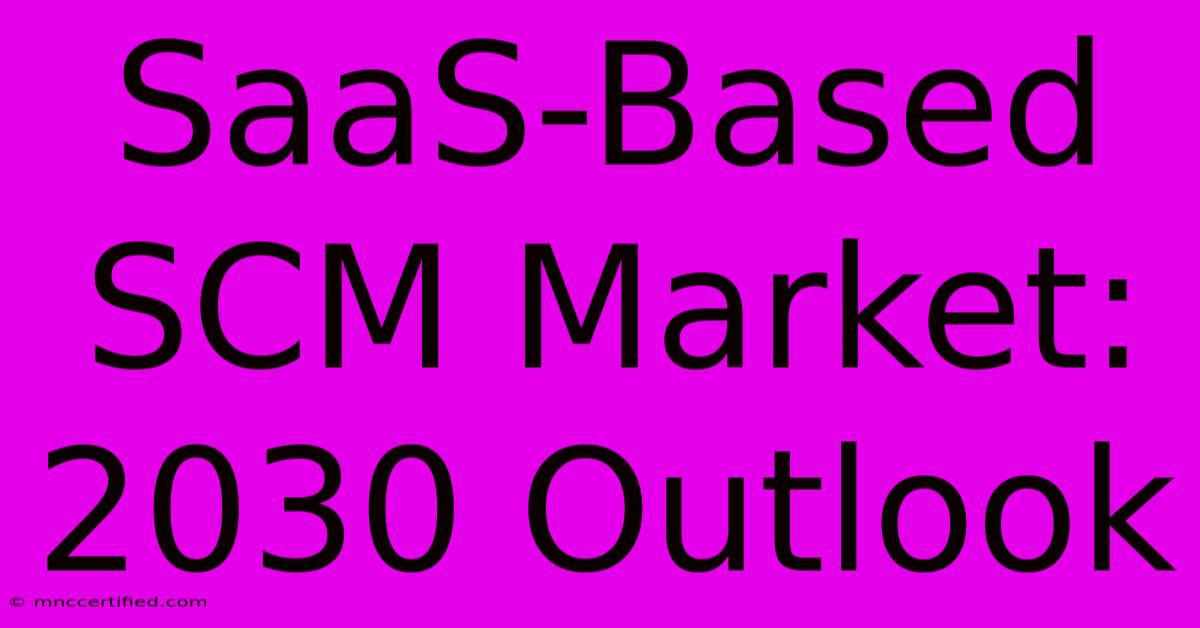SaaS-Based SCM Market: 2030 Outlook

Table of Contents
SaaS-Based SCM Market: A 2030 Outlook
The Supply Chain Management (SCM) landscape is undergoing a dramatic transformation, driven by the rapid adoption of Software as a Service (SaaS) solutions. This shift promises increased efficiency, scalability, and cost-effectiveness for businesses of all sizes. This article delves into the SaaS-based SCM market, exploring its current state, growth drivers, challenges, and a projected outlook for 2030.
The Current State of the SaaS-Based SCM Market
The SaaS-based SCM market is experiencing explosive growth. Businesses are increasingly recognizing the benefits of cloud-based solutions over traditional on-premise systems. These benefits include:
- Reduced IT infrastructure costs: No need for expensive hardware and software maintenance.
- Enhanced scalability and flexibility: Easily adapt to changing business needs and volumes.
- Improved accessibility and collaboration: Access data and collaborate with stakeholders from anywhere with an internet connection.
- Faster implementation and deployment: Quicker time-to-value compared to on-premise solutions.
- Automated processes: Streamline operations and reduce manual errors through automation.
- Real-time data visibility: Gain better insights into supply chain performance and identify potential bottlenecks.
Major players in the market include Oracle, SAP, Infor, and smaller niche players offering specialized solutions. The market is segmented by deployment mode (cloud, on-premise), industry (retail, manufacturing, healthcare), and functionality (planning, procurement, logistics, warehouse management).
Key Growth Drivers Fueling the Market Expansion
Several factors are contributing to the robust growth of the SaaS-based SCM market:
- Rising adoption of cloud computing: The overall shift towards cloud-based solutions is a major driver. Businesses are increasingly comfortable with cloud technology and its associated benefits.
- Growing demand for real-time visibility: Businesses need real-time data to make informed decisions and optimize their supply chains. SaaS solutions provide this critical visibility.
- Increasing need for supply chain resilience: Global events like the pandemic highlighted the need for robust and adaptable supply chains. SaaS solutions offer the agility to respond to disruptions effectively.
- Advancements in AI and machine learning: The integration of AI and ML into SaaS-based SCM solutions enhances forecasting accuracy, optimizes logistics, and improves decision-making.
- Increased focus on digital transformation: Businesses are investing heavily in digital transformation initiatives, and SaaS-based SCM is a key component of these strategies.
Challenges and Opportunities in the SaaS-Based SCM Market
Despite the significant growth, the market faces certain challenges:
- Data security and privacy concerns: Protecting sensitive data in the cloud is crucial. Robust security measures are essential to build trust and mitigate risks.
- Integration complexities: Integrating SaaS-based SCM solutions with existing enterprise systems can be complex and require significant effort.
- Vendor lock-in: Choosing a SaaS provider can lead to vendor lock-in, making it difficult to switch providers in the future.
- Lack of customization: Some SaaS solutions might lack the customization options needed by specific industries or businesses.
However, these challenges also present opportunities:
- Development of robust security protocols: The market is witnessing advancements in security technologies to address data privacy concerns.
- Improved integration capabilities: SaaS providers are continuously improving integration capabilities to simplify the implementation process.
- Rise of specialized niche players: Smaller companies are focusing on specific industry needs, offering tailored solutions.
- Development of hybrid models: Combining cloud-based and on-premise solutions can offer a balance between flexibility and control.
SaaS-Based SCM Market Outlook: 2030 Projections
By 2030, the SaaS-based SCM market is projected to experience significant growth, driven by the factors mentioned above. We anticipate:
- Wider adoption across all industries: SaaS-based SCM will become the standard across various sectors, including retail, manufacturing, healthcare, and logistics.
- Increased focus on AI and ML integration: AI and ML will become increasingly integrated into SaaS solutions, driving automation and optimization.
- Growth of specialized SaaS solutions: More specialized solutions catering to specific industry needs will emerge.
- Enhanced security and compliance: Robust security measures and compliance certifications will become a standard.
- Greater emphasis on data analytics: SaaS providers will focus on providing advanced analytics capabilities to empower better decision-making.
In Conclusion:
The SaaS-based SCM market presents a compelling opportunity for businesses seeking to optimize their supply chains. While challenges remain, the market's growth trajectory is undeniable. By 2030, we expect to see a significantly more mature and sophisticated market, characterized by increased adoption, enhanced functionality, and greater integration of advanced technologies. Businesses that embrace SaaS-based SCM solutions will be better positioned to navigate the complexities of the modern supply chain and achieve a competitive advantage.

Thank you for visiting our website wich cover about SaaS-Based SCM Market: 2030 Outlook. We hope the information provided has been useful to you. Feel free to contact us if you have any questions or need further assistance. See you next time and dont miss to bookmark.
Featured Posts
-
Ionic Bonds Pogil Answer Key
Nov 30, 2024
-
Watch Oregon State Vs Boise State Time And Channel
Nov 30, 2024
-
Is Airbnb Insurance Worth It
Nov 30, 2024
-
Typhoo Teas Administration Filing
Nov 30, 2024
-
Heaven Hill Bottled And Bond
Nov 30, 2024